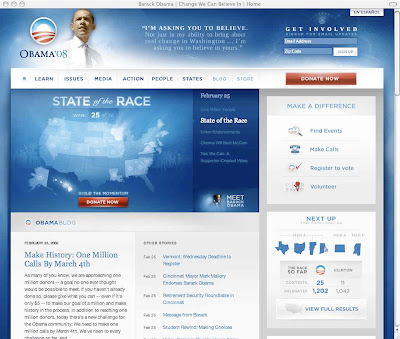Branding Obama
 In this historic presidential race, one thing has become increasingly clear: Barack Obama has become arguably the most well-branded candidate in history. Advertising Age featured an article today attesting to Obama's popularity, and the fact that he's managed to carry a significant demographic: the so-called creative class.
In this historic presidential race, one thing has become increasingly clear: Barack Obama has become arguably the most well-branded candidate in history. Advertising Age featured an article today attesting to Obama's popularity, and the fact that he's managed to carry a significant demographic: the so-called creative class.
Obviously, every candidate is using the internet, and history has even seen a few internet candidates, such as Howard Dean, who was among the first to capitalize on new media and the grassroots, viral support it could generate. Ironically, Dean's campaign was undone by a media-driven sound byte that overcame his message. Obama's campaign is different and significant for a few reasons.
He has not only leveraged the web, he's refined his message to simple, web-ready language that resonates with online audiences (younger, creative and affluent audiences) while maintaining a strong base off-line using the same message. It's a message, like all great brands, that can be boiled down to one or two words. It's a message of hope and change.
Obama's campaign has spread online largely through free, consumer-generated media, and it's gaining the lion's share of online interest. According to Ad Age, which cited the web-analytics firm, Compete, Obama's content generated triple the "FaceTime" of Clinton's while beating McCain's content on YouTube nearly 36 to 1.
Part of the reason is not merely due to the quantity of Obama's base of support. It's the quality of his support base that is allowing his content to thrive. Mash-ups and viral videos like Will.i.am's "Yes We Can" video (the subject of a previous blog), "Vote Different" (a nod to Apple's famous 1984-themed ad), plus "Hope Changes Everything" (below) and of course "Obama Girl" all have enjoyed tons of play time and rank among the top viral videos on the web.
Perhaps it's because many of these efforts were contributed by creative professionals drawn to Obama. Take Shepard Fairey for instance. From Advertising Age:
"His politics fall perfectly in line with what I do as an artist," said urban artist and guerrilla marketer Shepard Fairey, an Obama fan since 2004 who offered his endorsement via a striking poster series. "In advertising and marketing, things are simplified to accentuate the positive and utilize soundbites that are really powerful; it's about economical communications, and [Barack Obama] is really good at that," said Mr. Fairey. "That type of approach to politics -- when it seems like he really has conviction, too -- is really easy to distill down to marketable images. It felt really easy for me to make a poster for him." (see Fairey's poster above)
The New York Times also weighed-in on the brand-power of Obama February 4th when they compared candidate Web sites, claiming Obama's to be the more Mac-like versus Hillary's PC-like site. Despite Apple's small market share that in political terms could be considered a marginalized group, the comparison makes Obama's site the more creative, easier to use and compelling site, gaining Apple's enviable brand attributes and the rabid support of like-minded Mac fanatics (who make up the majority of the so-called creative class). Obama's appeal extends to many groups but perhaps the most meaningful group of supporters is this young, affluent, creative class that is carrying his multi-medium message to the masses, and is, in the process, building a tough brand to beat.
Obama's appeal extends to many groups but perhaps the most meaningful group of supporters is this young, affluent, creative class that is carrying his multi-medium message to the masses, and is, in the process, building a tough brand to beat.




